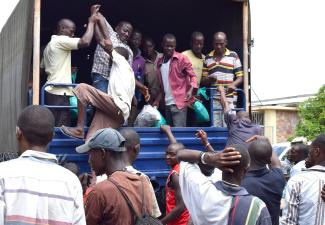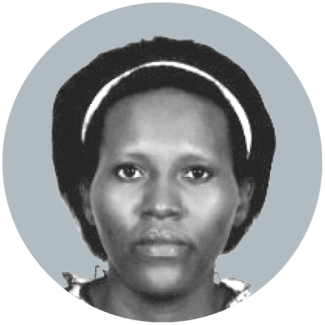Burundi
Overpopulated prisons

At the end of November 2018, there were officially 10,987 persons detained in Burundi’s prisons, which are only designed to hold 4,195. The country has 11 prisons and two institutions for young offenders. Eight of Burundi’s 18 provinces have no prison at all; the others’ correction facilities are bursting at the seams. More than half of the inmates are on remand awaiting trial. Many of them have been detained on remand for much longer than the 14-day time limit established by Burundian law.
Overcrowding is the biggest problem for Burundi’s prisons and their inmates, but it is not the only one. The buildings are very old, and their design makes it difficult to separate different groups of detainees from one another. Moreover, the prisons’ budget is too small to ensure that all prisoners get decent food, clothing, hygiene and medical care. For these factors, prison conditions are dire. They are compounded by a shortage of prison staff and the lack of any system that might prepare inmates for life after prison.
Nazim Yadat, a coordinator with the International Committee of the Red Cross (ICRC), points out that many detainees receive no legal assistance. He believes that remand in custody is being abused, with many accused persons staying imprisoned without trial for long periods. He sees a need for penal alternatives to prison sentencing and says that more must be done to help inmates not to commit further crimes after being released. The overcrowding is due partly to the high reoffending rate.
Numbers are growing
According to the local human-rights group APRODH, which has been working from exile since 2015, the number of people detained in Burundi’s prisons has risen sharply. In 2017, for instance, the population of the country’s largest detention centre, Mpimba Central Prison in the capital Bujumbura, grew from 3,141 to 3,670. At the Ngozi Men’s Detention Centre, the inmate number rose from 1,113 to 1,576, and at Gitega from 850 to 1,137.
Apart from the large number of prisoners on remand, inmates who should actually have been released are contributing to prison overcrowding. Fabien Banciryanino, a member of parliament without party affiliation, has submitted a list of 120 prisoners who fall into this category.
Burundi’s Vice-President Gaston Sindimwo conceded that such cases exist during a Nelson Mandela memorial in Mpimba in July. The justice ministry denies it, however – although Adolphe Havyarimana, its spokesman, promised that a commission of inquiry would be set up to investigate the matter.
Examples of persons who are illegally detained include nine members of Amizero y’Abarundi, the largest opposition alliance, in Bubanza Province in the west of the country. They are charged with posing a threat to domestic security. On 10 October, a court ordered their provisional release. But the order was not carried out. Instead, in early November, the accused were transferred to Bujumbura’s Mpimba Central Prison. In response to the opposition activists’ illegal detention, Agathon Rwasa, the leader of Amizero y’ Abarundi and first deputy speaker of the National Assembly, pointed out that court rulings must be obeyed. “A prison governor does not have any right to appraise a decision or add further considerations.”
Justice Minister Aimée Laurentine Kanyana has spoken of “irregularities” to explain the failure or slowness to carry out court orders. To avoid such irregularities in the future, she said, her ministry was considering computerised links between the courts and the prisons. “When a judgement is delivered, the prison governors will see it on their computer,” she explained. That would solve the problem of delays in compliance.
In April 2015, the political opposition and civil-society organisations launched protests against President Pierre Nkurunziza running for a third term. There were large rallies throughout the country, and the security services arrested protestors including members of the MSD opposition party. Masses of people, including MSD leader Alexis Sinduhije, fled abroad.
After months of unrest, Nkurunziza was confirmed in office in highly controversial elections (see Marc Niyonkuru in the debate section of D+C/E+Z e-Paper 2016/10). Some of the persons who were arrested have since been released, but not all. The opposition in exile, CNARED (Coalition National pour le Rétablissement de l’Accord d’Arusha et la Restauration d’un Etat de Droit), and opposition groups within the country refer to the detainees as political prisoners. Officially, however, ethnic, political and religious affiliation are not supposed to play any role in sentencing.
Pregnant women, the sick and the elderly released
President Nkurunziza regularly makes use of his constitutional right to pardon prisoners. In 2010, for instance, he set more than 1,300 inmates free. In 2012 he pardoned all pregnant women and nursing mothers, prisoners suffering from advanced incurable illness and all detainees over 60 or under 18. Exceptions were made in the case of prisoners sentenced for crimes against humanity, war crimes or rape. In the latest and largest round of pardons, in 2018, more than 2,000 detainees were released.
But according to Félix Niragira, the chairman of the Senate Justice Commission, such steps have done little to ease the pressure on Burundi’s prisons. Commission members visited ten of the correctional facilities, he says, and found them accommodating 8,583 prisoners although they were designed to hold only 3,800. That was after the presidential pardons were carried out.
Most national constitutions give the president the right to pardon convicted criminals. Legal scholars point out, however, that such provisions are meant to help to resolve rare individual cases with serious political, cultural or other implications. The general idea is not to allow the head of state to impose arbitrary rule by overriding judgements or circumventing court trials.
Indeed, APRODH, the human-rights group, argues that presidential pardons alone are not the solution to Burundi’s prison crisis. More needs to happen. The trials for those remanded in custody must accelerate, more defendants should be released on bail, and any accused who is acquitted must be released immediately.
Presidential pardoning is only helpful to some extent, says Gervais Hajayandi, the director of the National Prison Authority. Inmate numbers are already rising again. Since the pardons went through, Hajayandi reports, more than a thousand repeat offenders have been registered. After intensive deliberation, he says the Authority has decided to limit prison intakes.
Jean-Marie Nshimirimana of Ntabariza, a civil-society group that works to protect the rights of prisoners and their families, states categorically: “Freedom is the rule, remand in custody the exception.” Particularly in view of the poor conditions that detainees have had to endure in Burundi’s prisons, he says, this principle must be applied and the trial process accelerated.
Mireille Kanyange is a journalist and reporter for Radio Isanganiro in Burundi.
mika.kanyange@gmail.com








